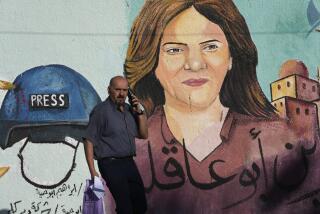Families of U.S. journalists missing in Syria filled with dread
Friends and relatives of Austin Tice, an American journalist who disappeared in Syria two years ago, were preparing to hold a candlelight church vigil for him in Houston on Tuesday when they received shattering news:
James Foley, an American journalist whose family had befriended the Tice family, had been killed in Syria by the militant group Islamic State. The extremists also threatened to execute a second captive American journalist, Steven J. Sotloff, if the United States does not halt airstrikes against the group in northern Iraq.
“That was just a terrible threat,” said Chris Brombacher, 27, a childhood friend of Tice who was attending the vigil. “There’s just such a feeling of helplessness. We all want to do something to help, but we don’t know what.”
For families of American journalists missing in Syria, Foley’s beheading and the death threat against Sotloff compound the sense of helplessness and dread.
------------
FOR THE RECORD
Captive journalists: In the Aug. 21 Section A, an article about concerns for the safety of American journalists who are missing or being held captive in Syria said that U.S. journalist James Foley was killed in Syria by the militant group Islamic State. In fact, the location of the killing is unknown.
------------
About 20 journalists from around the world are believed held by Islamist militant groups in Syria, many of them by Islamic State, said Sherif Mansour of the Committee to Protect Journalists in New York. Mansour said most are Syrians, and declined to say how many are American or to provide the names of any American or other foreign captives, saying their families and employers had asked that their identities not be made public.
An additional 12 journalists are believed held by the Syrian government, according to the Committee to Protect Journalists. In all, more than 80 journalists have been abducted in Syria since 2011, Mansour said. Seventy journalists have been killed covering the Syrian civil war, the organization said.
In some cases, kidnapped journalists from other countries have been freed, purportedly after ransom was secretly paid to their captors. Such payments, analysts believe, have been a key source of financing for some militant groups in Syria.
Four French journalists kidnapped in Syria in June 2013 were released in April, found blindfolded and bound on the Turkish border, according to an account in Britain’s Guardian newspaper. A month earlier, a Spanish reporter and photographer for El Mundo were freed in a similar fashion.
The U.S. and British governments have a long-standing policy against paying ransom.
Foley’s brother, Michael, may have been obliquely referring to the ban on payments when he spoke at a news conference Wednesday. “There’s more that can be done,” he said. “The footprint has been laid by some of the other nations.”
The video of Foley’s execution probably will harden U.S. and world opinion in support of tougher military action against Islamic State, even as it creates further anguish for families of those kidnapped, said Charlie Dunlap Jr., a retired Air Force major general who directs the Center on Law, Ethics and National Security at Duke University.
The threat is a crude attempt at intimidation, and a miscalculation, Dunlap said.
“You could see the president was clearly angered,” he said, referring to President Obama’s comments about the killing of Foley, 40, who went missing in Syria in 2012. “It’s very dangerous to get a democracy like the United States angered about a savage act against a U.S. citizen.
“From now on, they will never have a single day when the United States is not actively hunting them down.”
Islamic State’s threat to behead Sotloff, abducted in northern Syria in 2013, was “a very frightening thing to hear,” said Thomas Brombacher, who attended the Tice vigil Tuesday night.
Brombacher, whose son Chris was in the Boy Scouts with Tice, said Tuesday that the vigil was planned before the news of Foley’s death. The event marked the second anniversary of Tice’s 2012 disappearance in Damascus while freelancing for the Washington Post and Al Jazeera English. No group has taken responsibility for his disappearance.
“The last 635 days, we have had to share a horrible nightmare, which has made us close to the Foley family and our heart goes out to them,” Tice’s family said in a statement. “We pray eternal rest for James’ soul and comfort for his family.”
In an email Wednesday, Debra and Marc Tice, Austin’s parents, declined an interview request “out of respect for the privacy of the Foley family.”
Thomas Brombacher said Debra Tice made brief remarks at the vigil, held at a Catholic church. About 80 to 100 friends and family members attended, praying and honoring Austin Tice, 33, with a minute of silence.
“It wasn’t just for Austin,” the elder Brombacher said. “It also was a prayer for peace for Syrian families and what they’re going through over there.”
Chris Brombacher described Tice, an Eagle Scout and former Marine, as outgoing and warm-hearted.
“He cared about you,” he said. “He had a really big impact on my life.”
A friend issued a petition Wednesday asking Obama to take action to save Sotloff “by any means necessary.”
“Steven appeared at the end of a video in which reporter James Foley was beheaded,” according to the friend, who identified himself as the boyfriend of Sotloff’s sister, Lauren. The petition and comments appeared on Steven Sotloff’s Facebook page.
In the Islamic State video released Tuesday, a black-hooded militant forces Sotloff to kneel, grabs his collar and declares, “The life of this American citizen, Obama, depends on your next decision.”
Zucchino reported from Durham, N.C. Times staff writers Carol J. Williams in Los Angeles and Maeve Reston in Rochester, N.H., contributed to this report.
More to Read
Sign up for Essential California
The most important California stories and recommendations in your inbox every morning.
You may occasionally receive promotional content from the Los Angeles Times.











